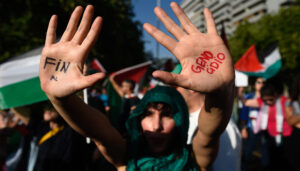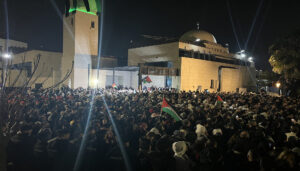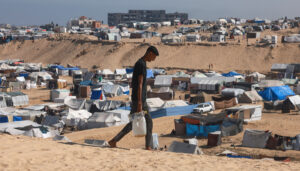
American Democratic Presidential Candidate Barack Obama speaking in Amman, Jordan via WSJ.
Written By: Rana F. Sweis
7iberDotCom — On a bustling street in downtown Amman, Farah Al Sayyad, 24, stares at a magazine showing American democratic presidential candidate Barack Obama walking up a flight of stairs while gazing at the sky.
“For me it’s not about if he will be good or great,” she says. “It’s about not doing something negative to us, like waging another war in the region.”
Suddenly her friend Eman Buraile, 23, turns around. “Wake up, Farah!” she interrupts. “I don’t really know who Obama is, but they are all the same.”
Some middle-class Jordanians say they do not know Obama well enough to judge his character or intentions. Yet, when they watch television or read translated texts of his speeches, they have no problem envisioning him in a character role.
“I imagine if he was working at an organization, he would be the person who is always out in the field experiencing things firsthand,” says Ali al-Beer, a young bookseller.
For Hadeel Sharif, who works at a salon in West Amman, Obama was the right choice for the Democratic Party. “I don’t know why but when I see him on television, I feel like I can sit with him and talk for hours,” she says. For others the fact that Obama is young and a minority has captivated them.
“What sets Obama apart is his age, more than his race or background,” says Sawsan Zaideh, manager of Radio Balad, a local community radio station. “It’s very important that he is young because you can see he is not living in the past and has this passion for positive change that has been absent in both America and the Middle East.”
Many Jordanians interviewed, including both conservatives and liberals, say they yearn for a change in American foreign policy. Just months ago, Jordanians seldom used words such as, ‘compassionate’, ‘charismatic’ or ‘caring’ when describing an American politician.
“The Arab street dreams of change and the day when greed and corruption ends in their region,” says Atef Al Jolani, Editor in Chief of Al Sabeel newspaper, an independent Islamic weekly. “All parties in Jordan, no matter what their political affiliations are, hope for progress not regression both at home and in the region.”
Nevertheless, some say they never tuned into election coverage due to a sense of dejection. They are simply resigned to the fact whoever wins in November, the next American president will not be able to change or promote peace in the region.
“There is a system, certain policies and lobbies in American politics and no matter who is elected they will follow it, so, I don’t care,” says Buraile, a sales supervisor. “He calls Jerusalem the undivided capital of Israel? I am not optimistic about peace in the region.”
The Democratic candidate shocked many Arabs in a speech to AIPAC, a pro-Israeli lobby, in which he promised his full support to Israel. Obama also called Jerusalem the “undivided capital” of Israel. He later clarified his comments, saying it was up to both Palestinians and Israelis to negotiate any final settlement.
Others are simply not paying attention. They are concerned with the notion that meat and chicken prices have risen 30 percent in less than a year, this in a country where 14 percent of its citizens already live under the poverty line, according to official estimates.
“Poor people in the Middle East don’t care about Obama’s character, all they are concerned about is someone saving them from their misery,” says Ahmad Al Hindawi, one of the founders of We Are All Jordan Youth Commission, an initiative launched by HM King Abdullah two years ago to enhance young people’s role in socio-economic and political plans. “I don’t blame them for tuning out on the details of American elections because they are busy struggling to put food on the table.”
Jordan being a small country with limited natural resources is heavily dependent on foreign aid—the second-largest recipient of U.S. foreign aid, when calculated on a per capita basis. It finds itself in a vulnerable position. Nevertheless, the US also understands Jordan’s strategic geographic location and it’s vital political role as a mediator and safe haven for its troubled neighbors.
“If a republican or a democrat is elected in November, I don’t believe their policy on Jordan will change at all,” says Bassam Haddadin, an elected parliamentarian since 1989. “There is a bond between the two countries that is based on diplomacy that will always triumph promoting democracy, in my opinion.”
A Free Trade Agreement (FTA) with the United States went into effect in 2001 and provides for free markets in communications, construction, finance, health, transportation and the protection of intellectual property. Textile and clothing exports to the United States increased by 2,000 percent from 2000 to 2005, following the introduction of the FTA. In 1996, Jordan and the United States signed a civil aviation agreement and a U.S.-Jordan treaty for the protection and encouragement of bilateral investment.
Before Obama visited the Middle East and Europe, Human Rights Watch (HRW) wrote a letter to Senator Obama stating among other things, human rights abuses in Jordan including claims of prison torture, a claim that the government continues to deny. The Jordanian government also called “incorrect,” a report accusing Jordan of torturing detainees and serving as a place for rendition of suspects by the United States.
“Obama made at least two press conferences in the Middle East yet he never spoke about human rights here in the region,” Haddadin explains. In his speech in Berlin in front of an audience of more than 200,000 people, Obama spoke of freedom of expression and humanitarian intervention.
This is the moment we must help answer the call for a new dawn in the Middle East…Will we stand for the human rights of the dissident in Burma, the blogger in Iran, or the voter in Zimbabwe? Will we give meaning to the words “never again” in Darfur?
Despite his admiration for Obama, Haddadin says it is difficult to predict if he will inject his sense of idealism in the Middle East. “He had to go to Europe to speak about freedom and rights in the Middle East?” Haddadin asks.
Of course, the lesson in history is that there is no final lesson. In history, the verdict reached on someone is oftentimes dependent upon when the end sign is posted. “He is articulate,” says Al-Beer, the bookseller. “However, he may talk and not act, so, we will have to wait and see.”
The World Loves Obama, Except Jordan. Read the post here.










